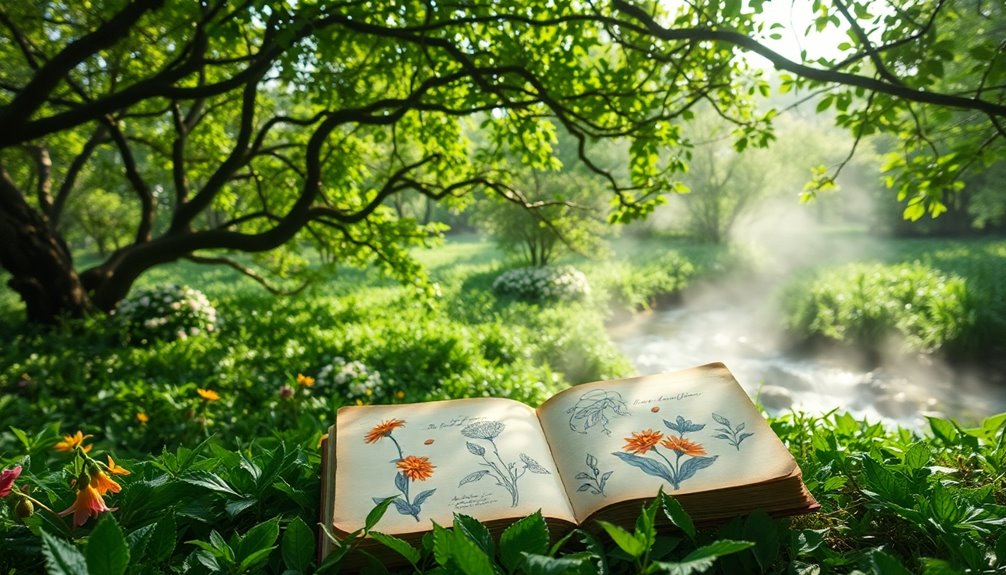*The Signature of All Things: A Botanical Epic* follows Alma Whittaker, a determined 19th-century botanist, as she navigates love, science, and societal expectations. Born into privilege, Alma sets out on a journey across various continents, studying evolution and the complexities of mosses. Her life intertwines with key relationships that challenge her ambitions and identity, reflecting the struggles women faced in male-dominated science. Throughout this rich narrative, themes of longing and discovery emerge, propelling Alma toward both intellectual triumph and personal growth. Keep exploring to uncover the powerful legacy of Alma and the impactful story of women's contributions to science.
Overview of the Novel

*The Signature of All Things* offers a rich tapestry of discovery and ambition through the life of Alma Whittaker, a talented botanist born in the early 19th century.
As you explore this historical fiction novel by Elizabeth Gilbert, you'll journey alongside Alma as she navigates her deep passion for botany. The story unfolds against the backdrop of the 19th century, a period brimming with scientific advancements and societal changes that shape Alma's experiences. This era also highlights the significant role of strong female protagonists who challenged conventions and made impactful contributions, much like the women in The Lost Apothecary who sought empowerment through their knowledge.
You'll find Alma's focus primarily on her studies of mosses, a reflection of her meticulous nature and unwavering dedication to her work.
The narrative takes you from Philadelphia to London, Peru, Tahiti, and Amsterdam, each location enriching her quest for knowledge.
As you read, you'll witness the intersection of adventure, love, and the exploration of science and spirituality, all pivotal to Alma's growth.
Gilbert's portrayal of Alma Whittaker not only emphasizes the contributions of women in science but also highlights themes of patience and the relentless search for understanding, making this novel both a personal and intellectual journey. The exploration of generational poverty adds depth to the backdrop of scientific discovery and personal ambition.
You're bound to be captivated by the complexity of its characters and their emotional landscapes.
Main Character: Alma Whittaker
Exploring the intricate life of Alma Whittaker reveals a character driven by an insatiable curiosity and a deep love for botany. Born in 1800 in Philadelphia, she's the daughter of wealthy businessman Henry Whittaker, which grants her access to education that many women of her time lack. This privilege allows her to delve into the complexities of the evolution of species, mirroring significant scientific advancements of her era, including the fascinating study of immortal jellyfish, which showcases nature's unique adaptations.
Despite being clever, you'll notice Alma doesn't fit conventional beauty standards, and she grapples with societal expectations while pursuing knowledge in a male-dominated field.
As a skilled botanist, Alma focuses particularly on the study of mosses, making significant contributions to the understanding of evolution during the 19th century. Her relationships, especially with her sister Prudence and husband Ambrose Pike, reveal her internal conflicts—she longs for connection even as she immerses herself in her botanical studies.
Ultimately, Alma undertakes a transformative journey that takes her from her comfortable estate in Philadelphia to the exotic landscapes of Tahiti. This quest isn't just about scientific discovery; it's also a deeply personal search for enlightenment, showcasing her determination to reconcile her passions with her desires for love and understanding in a complex world. Along the way, Alma's story illustrates themes of resilience and determination, highlighting her unwavering resolve to thrive in a challenging environment.
Themes of Longing and Discovery

Longing and discovery permeate the narrative of *The Signature of All Things*, revealing the depths of Alma Whittaker's emotional landscape. Alma embodies a profound longing for love and knowledge, which starkly contrasts with her sister Prudence's beauty and social acceptance. This yearning reflects her struggle against the confines of a repressive 19th-century society, where women face significant barriers to expressing their desires. In the backdrop of societal oppression, Alma's quest for knowledge mirrors the resilience against tyranny faced by characters in other narratives.
As Alma immerses herself in the world of mosses, her fascination becomes a metaphor for her slow-moving existence and the contradictions within her. The narrative explores her relationship with Ambrose Pike, illustrating the complexities of love and disappointment. Their differing views on nature lead to unfulfilled expectations, leaving Alma grappling with her feelings.
Alma's journey to Tahiti marks a pivotal point in her quest for clarity. This journey isn't just physical; it's a spiritual exploration aimed at uncovering truths about herself and her relationships.
Through longing and discovery, you witness Alma's evolution as she seeks to reconcile her inner struggles with the world around her. Additionally, her story reflects the broader theme of resilience and strength in overcoming societal limitations, reminiscent of the challenges faced by women in various narratives of survival.
Literary Style and Detail
Alma Whittaker's journey of longing and discovery unfolds against a backdrop rich in detail and historical context, showcasing Elizabeth Gilbert's literary prowess. You'll find yourself immersed in the 19th-century world, where Gilbert's richly detailed prose paints vibrant scenes that enhance Alma's journey. The narrative's exploration of social realities echoes the vivid character portrayals found in classic literature like Dickens' works.
The narrative spans diverse locations, from the lush greenery of Kew Gardens to the enchanting shores of Tahiti, balancing epic storytelling with intimate human experiences. The importance of a growth mindset becomes evident as Alma navigates her pursuits, showcasing how embracing challenges can lead to personal transformation.
- Deeply relatable and complex characterization of Alma
- A seamless blend of scientific inquiry and personal growth
- Exploration of universal themes like curiosity and knowledge
- Immersive environmental context that enhances the narrative
Gilbert's style captivates you by revealing the intricacies of both the natural world and Alma's emotional landscape. You'll appreciate how she navigates her intellectual pursuits and personal relationships, making her life feel both profound and relatable. While set in the past, the themes resonate with contemporary readers, inviting you to reflect on your own journey of discovery. Additionally, the novel emphasizes the importance of friendship and bravery as Alma faces various challenges throughout her life.
Contributions to Science and Gender

In *The Signature of All Things*, the significant yet often overlooked contributions of women in botany come to life through the character of Alma Whittaker. You see Alma maneuvering a male-dominated scientific landscape in the 19th century, where her research on mosses not only highlights her dedication but also the gender biases that women faced. Her struggle for recognition showcases the barriers women had to overcome to make meaningful contributions to science. Resistance movements during World War II also parallel her fight for acknowledgment, illustrating that collective action can lead to significant change against oppressive structures.
The novel reflects societal shifts regarding women's roles in science, paralleling Alma's personal growth with the early women's movement. You witness how Alma's eventual recognition symbolizes a broader commentary on the importance of acknowledging both visible and invisible contributions to knowledge. Moreover, the contrasting narratives of Alma and her sister Prudence reveal different facets of femininity, emphasizing that both beauty and intellect play vital roles in history. Through these characters, the story illustrates how gender dynamics shaped scientific inquiry and celebrates the diverse ways women exert influence, reminding you that contributions from both men and women are essential to the advancement of knowledge. Additionally, the struggles depicted in the novel resonate with the historical context of women's roles in various scientific fields, highlighting the persistent challenges faced by women like Alma. In this light, co-dependent relationships are also reflected in the dynamics between Alma and her contemporaries, showcasing how societal expectations influenced their contributions.
Scientific Themes and Discoveries
How does Alma Whittaker's dedication to studying mosses illuminate the broader scientific themes of evolution and adaptation? By immersing herself in the world of these humble plants, you see her exploration of evolutionary theories come alive.
Alma's work parallels the groundbreaking ideas of Charles Darwin and his concepts from "On the Origin of Species." Through her observations, she develops her theory of competitive alteration, which investigates the survival mechanisms of mosses within their environments.
- Evolutionary theories are intricately linked to the study of plant life.
- Alma's research echoes the contributions of contemporaries like Darwin and Wallace.
- Her theory addresses the complexities of adaptation and survival.
- Alma's journey reflects the intersection of personal growth and scientific discovery.
In this narrative, you witness how Alma's passion for mosses reveals the interconnectedness of scientific inquiry and the evolution of life.
Her character challenges the societal norms of her time, illustrating that women can excel in science, thereby reshaping the narrative of scientific discovery in the 19th century. Additionally, her work resonates with the contributions of unsung pioneers in science who have often been overlooked in the history of scientific advancement.
Through her lens, you grasp the profound significance of mosses in understanding the broader themes of evolution.
Key Relationships in the Narrative

In "The Signature of All Things," you'll see how Alma's rivalry with her sister Prudence shapes her identity and self-worth.
The union between Alma and Ambrose highlights the tension between desire and intellectual connection, ultimately leading to her emotional growth.
Additionally, the familial bonds and struggles within the Whittaker family reveal the complexities of love and ambition in a restrictive society.
Alma and Prudence's Rivalry
Alma and Prudence's rivalry vividly illustrates the complexities of sisterhood and societal expectations in the 19th century. You see how their contrasting qualities fuel a deep-seated tension. While Prudence embodies traditional femininity—beauty, charm, and nurturing—Alma's intellect and ambition set her apart, leading to feelings of inadequacy. The stakes are high as they navigate their roles in a male-dominated world.
- Beauty vs. Brains: Prudence's allure attracts suitors while Alma feels invisible.
- Societal Expectations: Prudence's selflessness clashes with Alma's desire for knowledge.
- Isolation: Alma's pursuit of botany often leaves her feeling lonely and unfulfilled.
- Struggle for Identity: Both sisters grapple with their identities in a constraining society.
Their rivalry isn't just personal; it reflects the larger struggles women faced during this era. Alma's longing for love and validation only deepens the divide, demonstrating the painful complexity of their relationship.
Ultimately, their interactions shed light on the societal pressures that define them, revealing a poignant narrative of competition and vulnerability.
Ambrose and Alma's Union
Amid the lush backdrop of botanical exploration, the union between Alma Whittaker and Ambrose Pike unfolds as a complex tapestry of intellectual stimulation and emotional distance.
You see a marriage founded on deep conversations and shared passions, yet it's marred by significant tension due to their differing views on nature and sexuality. Ambrose proposes a sexless marriage, an unconventional arrangement that leaves Alma feeling unfulfilled and longing for emotional intimacy. This longing becomes a central theme of their relationship, as Alma grapples with her desire for closeness while Ambrose struggles to meet those needs.
As time goes on, the chasm between them widens, fueled by Ambrose's eventual banishment to Tahiti. His departure not only complicates their bond but also forces Alma to confront her feelings of loss and abandonment.
At 51, Alma's journey to Tahiti becomes a pivotal moment for her, allowing her to reflect on her past with Ambrose. She seeks clarity about their relationship, exploring the intricate intersections of love, science, and spirituality, ultimately questioning what it means to truly connect with another person.
Familial Bonds and Struggles
While traversing the intricacies of her familial relationships, Alma Whittaker faces challenges that shape her identity and aspirations. These connections reveal the depths of her struggles and the complexities of her desires.
- The tension between wealth and intellect with Alma's father, Henry Whittaker.
- Rivalry with her adopted sister, Prudence, fostering feelings of inadequacy.
- Misunderstandings in her marriage to Ambrose Pike, highlighting emotional conflicts.
- Support from her mother, Beatrix, and housekeeper, Hanneke, guiding her growth.
Alma's bond with her father is fraught with tension as he amasses a fortune in the quinine trade while she seeks her place in the world of botany. This dichotomy leaves her grappling with her ambitions.
Her relationship with Prudence, her adopted sister, complicates matters further, marked by rivalry and contrasting appearances, leaving Alma longing for acceptance.
Meanwhile, her tumultuous marriage to Ambrose amplifies her internal conflict, forcing her to balance her intellectual pursuits with her emotional needs.
Despite these struggles, the guidance of her mother and Hanneke provides the support she desperately needs, ultimately shaping her into a resilient woman maneuvering a male-dominated field.
Alma's Life Journey
Alma Whittaker's journey begins in a privileged childhood that sparks her passion for botany.
As you explore her relationships, you'll notice her deep longing for connection and knowledge shaped by societal constraints.
This struggle sets the stage for her eventual quest for self-discovery and fulfillment.
Childhood and Education
In the early years of her life, a young girl named Alma Whittaker grew up in the affluent estate of White Acre, where her father's wealth allowed her access to an extensive education. Her mother, Beatrix, sparked her curiosity in botany and Latin, nurturing a deep passion for the natural world, particularly mosses.
- Surrounded by her father's vast library, she thrived on knowledge.
- Prominent botanists influenced her burgeoning scientific acumen.
- Despite her intelligence, she struggled with feelings of inadequacy compared to her beautiful sister, Prudence.
- Alma's education laid the groundwork for her future pursuits in botany.
These formative years shaped Alma Whittaker into a determined young woman, enthusiastic to understand the complexities of nature.
Her education wasn't just about learning; it was a journey that ignited her lifelong fascination with plants. As she navigated her self-worth against the backdrop of societal expectations, her passion for botany became both an escape and a purpose.
This blend of privilege and personal challenge would ultimately guide her towards a remarkable scientific career, where she sought her place within the intricate tapestry of the natural world.
Relationships and Longing
Amidst the backdrop of her remarkable intellect, Alma Whittaker's life unfolds through a series of complex relationships that both enrich and challenge her.
You see her struggle with feelings of inadequacy, especially in her dynamic with her sister, Prudence. While Prudence's beauty accentuates Alma's longing for love and acceptance, it also fuels a deep-seated emotional conflict within her.
Her marriage to Ambrose Pike, driven by a desire for emotional and sexual connection, ultimately reveals profound differences in their views on love and nature. This disconnect leaves Alma feeling frustrated and isolated, deepening her longing for understanding.
As she navigates her emotional landscape, Alma's fascination with mosses symbolizes her slow and unfulfilled journey toward self-discovery.
A pivotal journey to Tahiti with Ambrose becomes a quest for clarity, allowing you to witness her internal conflict and yearning for truth.
Throughout her life, Alma grapples with the tension between her intellectual pursuits and her desire for personal connections. This struggle highlights the emotional depth of Alma Whittaker, showcasing her relentless quest for knowledge while longing for meaningful relationships.
Philosophical Questions Explored

Exploring the depths of philosophical inquiry, *The Signature of All Things* dives into the tensions between altruism and self-interest.
You'll find Alma grappling with complex questions that challenge her understanding of nature and humanity. Her observations lead you to reflect on vital themes, such as:
- The balance between individual desires and the greater good
- The concept of competitive alteration in survival
- The blurred lines of heroism and villainy within societal norms
- The spiritual quest for understanding human interconnectedness
Alma's theory of competitive alteration prompts you to contemplate how self-sacrifice intertwines with personal ambition.
As she navigates her relationships and the natural world, you're invited to explore what it means to be altruistic in a society that often rewards self-interest.
The narrative also raises profound questions about the interconnectedness of lives, emphasizing that every action, no matter how small, contributes to the broader tapestry of history and science.
Ultimately, The Signature of All Things challenges you to reconsider the motivations behind human behavior, urging you to ponder the delicate balance between selflessness and selfishness in your own life.
Critical Reception and Impact
*The Signature of All Things* garnered significant praise for its character complexity and the themes of patience woven throughout the narrative.
Critics noted how the novel's exploration of intricate ideas encourages a deeper understanding of both science and spirituality.
This recognition not only highlights the book's impact but also prompts discussions around the broader implications of its themes in today's literary landscape.
Character Complexity Acknowledged
Readers have acknowledged the remarkable complexity of Alma Whittaker's character in *The Signature of All Things*, which brings her intellectual depth and emotional struggles to the forefront. Critics have celebrated her journey as a reflection of universal themes, particularly in the context of 19th-century scientific exploration.
- Alma's evolution mirrors the challenges many women faced in pursuing knowledge.
- The novel intricately weaves scientific inquiry with personal discovery.
- Alma's character development showcases the layers of genius and perseverance.
- Her story resonates with contemporary discussions about women's contributions to science.
Elizabeth Day from The Guardian emphasizes Alma's growth, noting how relatable her experiences are as she navigates a male-dominated field.
Similarly, Barbara Kingsolver, writing for The New York Times, highlights the homage to genius within the narrative, illustrating how Alma's journey unfolds through patience and persistence.
This exploration of truth in nature and the recognition of women's roles in science has struck a chord with readers, establishing the novel as a significant work in contemporary literature.
Ultimately, Alma Whittaker stands as a representation of the complexities of intellect and emotion, inviting readers to reflect on their understanding of both.
Themes of Patience Highlighted
Alma Whittaker's journey not only showcases her intellectual complexity but also highlights the theme of patience, a cornerstone of her character and her scientific endeavors. Through her meticulous study of moss, you see how patience plays a crucial role in both scientific discovery and personal growth. Critics, including Barbara Kingsolver, commend the novel as an homage to intellectual perseverance, pointing out that Alma's dedication reflects the necessity of patience in understanding nature's complex truths.
Elizabeth Day's review in The Guardian emphasizes that Alma's patient pursuit of knowledge mirrors the slow, evolutionary changes inherent in her botanical studies. This theme resonates throughout the narrative, serving as a commentary on the 19th-century scientific landscape, where incremental advancements often lead to profound breakthroughs.
The book's critical reception acknowledges that cultivating patience is essential to the human experience, allowing deeper understanding and connection with the world around us.
In your exploration of Alma Whittaker's journey, you'll recognize how her patience not only shapes her character but also enriches the reader's appreciation for the slow, intricate process of discovery in both science and life.
Legacy of the Novel

With a rich tapestry of themes woven throughout, *The Signature of All Things* has carved out a significant legacy in contemporary literature.
Elizabeth Gilbert's novel not only won the Women's Prize for Fiction but also sparked crucial conversations about the role of women in science, particularly through the character of Alma Whittaker.
You'll find her journey mirrors the struggles and contributions of female intellectuals in the 19th century, challenging societal norms.
- Highlights the importance of patience in scientific inquiry
- Explores the interconnectedness of evolution and personal growth
- Provokes discussions on collaboration within scientific communities
- Encourages reflections on overlooked individuals in history
Conclusion
In "The Signature of All Things," you traverse a lush landscape of discovery alongside Alma Whittaker, much like a curious botanist unearthing hidden treasures in a vibrant garden. Her journey unfurls like a delicate vine, intertwining science and the complexities of existence. As you close the pages, you're left with the lingering scent of adventure and the echoes of philosophical musings, reminding you that every leaf tells a story, waiting to be explored.



